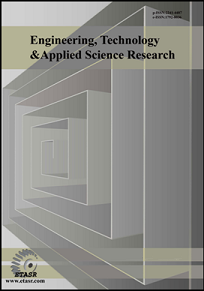Strengthening Strategies for RC Beams with Vertical Openings Using Embedded Steel Bars
Corresponding author: Haider Abedulrudha Ghani
Abstract
Circular or rectangular openings are often incorporated into Reinforced Concrete (RC) beams to accommodate the service requirements of the buildings, such as telephone lines, sewage systems, and water supply pipes. These concrete beams need to be strengthened and repaired, as the presence of openings reduces their stiffness, which results in severe deformations and a significant redistribution of load. An experimental study of the impact of vertical openings on the structural behavior of simply supported RC beams is presented in this research. Five RC beams were tested as part of the experiment. The beams were split into two groups based on the vertical opening's shape. One of the beams was kept as a reference beam (without any openings). One beam in each group was internally strengthened with reinforcing steel rebar, whereas the other was not. The experimental findings demonstrated that, for all studied specimens, independent of the opening shape, the development of openings within the RC beams resulted in an increase in the service midspan deflection and a decrease in the ultimate load carrying capacity. The maximum decrease in the ultimate load was approximately 27.7% for the un-strengthened specimens compared to the reference specimen. In contrast, compared to the beams without reinforcement, the rebar strengthening was successful in enhancing the ultimate load and reducing the service midspan deflection by approximately 19% and 29%, respectively. Additionally, the experimental results demonstrated that, when compared to a reference beam, the strain values of the top and bottom steel reinforcement at the mid-span increased at the same applied load level (at service load). However, when additional steel reinforcement was used to strengthen the beam around the vertical openings, the strain in both the top and bottom rebar decreased.
Keywords:
component, reinforced concrete beam, vertical opening, strengtheningDownloads
References
H. H. Ali and A. M. I. Said, "Flexural behavior of concrete beams with horizontal and vertical openings reinforced by glass-fiber-reinforced polymer (GFRP) bars," Journal of the Mechanical Behavior of Materials, vol. 31, no. 1, pp. 407–415, July 2022.
M. Abdul Jabbar Hassan and A. F. Izzet, "Finite element modeling of RC gable roof beams with openings of different sizes and configurations," Mechanics of Advanced Materials and Structures, vol. 28, no. 15, pp. 1604–1620, Aug. 2021.
I. Al-Shaarbaf and N. Al-Bayati, "Nonlinear Finite Element Analysis of Reinforced Concrete Beams with Large Opening under Flexure," Engineering and Technology Journal, vol. 25, no. 2, pp. 210–228, Feb. 2007.
N. K. Oukaili and A. H. Shammari, "Response of Reinforced Concrete Beams with Multiple Web Openings to Static Load," presented at the Fourth Asia-Pacific Conference on FRP in Structures, Melbourne, Australia, Dec. 2013.
T. Liu, S. Chen, Z. Feng, and H. Liu, "Effect of Web Openings on Flexural Behaviour of Underground Metro Station RC Beams under Static and Cyclic Loading," Advances in Civil Engineering, vol. 2020, no. 1, Jan. 2020, Art. no. 1210485.
N. M. J. Al-Quraishy, T. M. S. Alrudaini, and Y. J. Lafta, “Effect of Openings on the Performance of Continuous RC One-Way Slabs,” Engineering, Technology & Applied Science Research, vol. 15, no. 2, pp. 20959–20965, Apr. 2025.
M. B. Dawood and R. A. Al-Jazaeri, "Shear Behavior of Reinforced Concrete-Beams with Openings in Flange and Strengthened by CFRP Laminates," Journal of University of Babylon for Engineering Sciences, vol. 22, no. 2, Jan. 2014.
H. H. Ali and A. I. Said, "Experimental Study on the Performance of Concrete Beams Including Holes Reinforced with Glass Fiber Polymer," E3S Web of Conferences, vol. 427, 2023, Art. no. 02010.
M. A. Shneet and A. F. Izzet, "Strengthening Reinforced Concrete Beams with Vertical Perforations by using Steel-Plate Tubing," Engineering, Technology & Applied Science Research, vol. 14, no. 4, pp. 15482–15487, Aug. 2024.
M. Y. Mohammed, A. Y. Ali, M. M. A. Kadhim, and A. Jawdhari, "RC Deep Beams with Vertical Openings: Behavior and Proposed Mitigation Techniques," Practice Periodical on Structural Design and Construction, vol. 29, no. 1, Feb. 2024, Art. no. 04023060.
Iraqi Standard Specification: Portland Cement, Iraqi Specifications Number 5, Central Organization for Standardization and Quality Control Baghdad, Iraq, 2019.
Standard Specification for Portland Cement, ASTM C150/C150M-21, ASTM International, West Conshohocken, Pennsylvania, USA, 2021.
Iraqi Standard Specification: Natural Aggregate, Iraqi Specifications Number 2, Central Organization for Standardization and Quality Control, Baghdad, Iraq, 2016.
Standard Specification for Concrete Aggregate, ASTM C33/C33M-18, ASTM International, West Conshohocken, Pennsylvania, USA, 2018.
Standard Specification for Deformed and Plain Carbon-Steel Bars for Concrete Reinforcement, ASTM A615/A615M-20, ASTM International, West Conshohocken, Pennsylvania, USA, 2020.
Standard Practice for Selecting Proportions for Normal, Heavyweight, and Mass Concrete, ACI PRC-211.1-91, American Concrete Institute, Farmington Hills, MI, USA, 2002.
Downloads
How to Cite
License
Copyright (c) 2025 Haider Abedulrudha Ghani, Amer F. Izzet

This work is licensed under a Creative Commons Attribution 4.0 International License.
Authors who publish with this journal agree to the following terms:
- Authors retain the copyright and grant the journal the right of first publication with the work simultaneously licensed under a Creative Commons Attribution License that allows others to share the work with an acknowledgement of the work's authorship and initial publication in this journal.
- Authors are able to enter into separate, additional contractual arrangements for the non-exclusive distribution of the journal's published version of the work (e.g., post it to an institutional repository or publish it in a book), with an acknowledgement of its initial publication in this journal.
- Authors are permitted and encouraged to post their work online (e.g., in institutional repositories or on their website) after its publication in ETASR with an acknowledgement of its initial publication in this journal.

